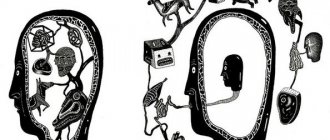Socionics, whose personality types are subject to comparison with the standard, is comparable to a horoscope that determines patterned forms of behavior, for example, “Typical Balzac” or “Typical Napoleon”. The interaction of people, according to dubious teachings, is based on certain attitudes: from complete cordiality to mutual hatred.
Psychologist does not mistake socionics for science
Why is socionics needed?
Types of conflicting personalities - what they are and their characteristics
The concept of socionics helps to better understand yourself and others, productively solve personal and professional problems, discover true talents and realize yourself in the right direction. Basic knowledge of personality prototypes also allows you to find common ground in controversial issues between family, friends, and strangers, and to accept your opponent’s worldview.
Interesting. If you correctly determine the sociotypes of people, it will not be difficult to predict their behavior in certain situations. Understanding the characteristics of sociotypes simplifies the selection of work teams. For individual tasks, it is worth selecting a candidate who can cope in the best possible way.
Analyst
The personality types of this group are distinguished by a sharp mind, logical thinking, the ability to highlight the main thing, fairness and objectivity. It includes strategists, logicians, commanders and debaters. Such subtypes have sharp judgments and principled assessments. If these people are not satisfied with the rules, they are ignored.
Strategist (architect)
Such a person is rare. He has a wonderful imagination, thinking, and indomitable mind. This type is decisive, prone to ambition, does not waste energy, and values his own individuality. A strategist is a cynical idealist who is confident that he will achieve what he wants, does not accept rules or restrictions, and acts according to principles. He is proactive, does not wait to be asked, to explain what to do.
Logician
An educated person who considers himself exceptional, smart and proud of it. This type loves to unravel complex problems and looks for inconsistencies in proven facts. A person is not interested in everyday life, he completely surrenders to situations where he realizes himself. This type is constantly thinking, therefore thoughtful, shy, but changes dramatically during a discussion or argument.
Commanding
This is a charismatic and self-confident leader who easily gathers crowds of attentive listeners and zealous followers, although he talks about ordinary, inconspicuous things. The commander is a dominant person who insists and forces people to accept their point of view.
Wrangler
A thinker who is constantly busy training his sparkling mind. This type is honest, argues tirelessly, and defends an idea even when he doesn’t believe in it. A person studies the subject inside and out so that the opponent has no chances or questions.
Areas of use
Types of human temperament and their brief characteristics
Knowledge of the basics of socionics gives good returns in the following cases:
- Staffing classes and study groups. A harmonious combination of the temperamental characteristics of the types contributes to a friendly working atmosphere and automatic resolution of discipline problems.
- Subject-differentiated training in high school and university seminars, where the priority will be the “club”, discussion method of considering issues.
- Individual approach to students to provide opportunities for self-realization.
Knowledge of the types of people in socionics simplifies management consultations for organizations and contributes to the creation of a stable team of broad-spectrum employees and target groups for the implementation of specific tasks. Sociologically competent staff formation saves people’s money, time and nerves.
The best sociotypes in business
Pseudoscience makes an invaluable contribution to self-development and harmonization of relationships in the family and society. Perception of oneself, possible scenarios for the development of relationships helps to identify hidden mechanisms of quarrels, misunderstandings, and prevents the likelihood of irreparable mistakes.
Why you need to know your psychotype
You can already encounter socionics in completely different areas of our lives. Knowing your psychotype, you can make the right choice:
- In personnel selection and training.
- In increasing the effectiveness of organizational management.
- In creating innovations.
- In the correctness of treatment, prevention of psychosomatics.
- In career guidance for any age category.
- In the correct educational process (special institutions).
- In organizing communication and acquaintance.
- Self-knowledge and development.
How to determine your personality type
When studying psychosophy, many are interested in knowing the basic characteristics on the basis of which the personality typology is formed. Socionics requires the use of several methods for determining it. One method excludes the reliability of the result.
Various ways of obtaining information help determine the socionic personality type:
- Tests.
- Interview.
- Experiments. The method of determining a sociotype is implemented in special conditions by setting a real task for the person being typed. A person’s reactions, actions, and decisions determine the conclusion about the method of data processing.
- Observation. The object is the actions and reactions of the individual, and the person’s appearance (portrait resemblance) is taken into account.
- Studying the dossier based on documents, texts, eyewitness accounts, diaries, creative results, photos, video materials.
Observed manifestations of personalities are used for comparison with standards used to classify people's sociotypes.
Socionic diagnostic algorithm
Guides (seekers)
These are free artists who take pleasure in destroying traditions with creative attempts and impulses. The group includes virtuosos, adventurers, entrepreneurs and entertainers. These psychotypes offer unexpected options and generate ideas. They often exhibit strange, laid-back behavior, which is normal for them. It is difficult for them to complete a task during the working day; it is better to give them freedom and allow an individual schedule.
Virtuoso
This is a person who is busy with creativity and has the following characteristics:
- He explores the world with curiosity, is rational and enthusiastic.
- He happily helps others, shares his own experience, and constantly strives to improve life.
- Often mysterious.
- Friendly, but closed, outwardly calm, but restless.
- Makes decisions based on practical experience.
- A brave innovator, he knows a lot and can do it.
Adventurer
Portrait of a psychotype:
- An artist who experiments with appearance and behavior destroys generally accepted traditions and foundations.
- An introvert, he spends periods of solitude on introspection. Often reconsiders his views on life, relationships with loved ones, his place in the world, and his own values.
- He is sensitive to people and feelings.
- He doesn’t look into the future, doesn’t make plans, lives today, at a specific moment.
- Flexible, creative, enthusiastically takes on new projects and tasks. At such a moment, many productive ideas are generated.
Entrepreneur
A successful businessman who is comfortable in the spotlight has the following characteristics:
- He discusses current topics with pleasure, does not plan anything, does everything at once, corrects shortcomings and mistakes right on the go.
- He likes to take risks, has difficulty adapting to society, prefers a free life, working outside of the schedule. It is useless to force such a person into a rigid framework - he quickly loses interest and falls into apathy.
- Under comfortable conditions, an energetic, receptive employee who takes risks if the project fails.
- He has an expressive disposition, but is right in 99% of situations.
Entertainer
Such a person is constantly happy, lives in the moment, his distinctive features are:
- Aesthetically developed, observant, attentive to others, supportive, helpful.
- Avoids conflicts, resolves everything peacefully.
- Prefers luxurious things and often lives beyond his means.
- He doesn't like to plan, so he often loses what he has.
- There is never a dull moment with him – he lifts your spirits and gives you ideas on how to resolve the situation or get out of it.
Personality type compatibility
The compatibility table will show a complete picture of the relationships between sociotypes.
Determining the compatibility of sociotypes
| Psychotype of personality | 1 | 2 | 3 | 4 | 5 | 6 | 7 | 8 | 9 | 10 | 11 | 12 | 13 | 14 | 15 | 16 |
| 1 | T | D | A | Z | P | R | D | M | se | pp | kt | K | P | R | ro | P.D. |
| 2 | D | T | Z | A | R | P | M | D | pp | se | K | kt | R | P | P.D. | ro |
| 3 | A | Z | T | D | ro | pd | P | R | kt | K | se | pp | d | M | p | r |
| 4 | Z | A | D | T | pd | ro | r | P | K | kt | pp | se | M | d | r | p |
| 5 | P | R | ro | pd | T | D | A | Z | p | r | d | M | se | pp | kt | K |
| 6 | R | P | pd | ro | D | T | Z | A | r | p | M | d | pp | se | K | kt |
| 7 | d | M | r | r | A | Z | T | D | ro | P.D. | P | R | kt | K | se | pp |
| 8 | M | D | r | p | Z | A | D | T | P.D. | ro | R | P | K | kt | pp | se |
| 9 | se | pp | kt | K | P | R | ro | pd | T | D | A | Z | p | r | d | M |
| 10 | pp | se | K | kt | R | P | pd | ro | D | T | Z | A | r | p | M | d |
| 11 | kt | K | se | pp | d | M | p | r | A | Z | T | D | ro | pd | P | R |
| 12 | K | kt | pp | se | M | d | r | p | Z | A | D | T | pd | ro | R | P |
| 13 | p | r | d | M | se | pp | kt | K | P | R | ro | pd | T | D | A | Z |
| 14 | r | p | M | d | pp | se | K | kt | R | P | pd | ro | D | T | Z | A |
| 15 | ro | pd | P | R | kt | K | se | pp | d | M | p | r | A | Z | T | D |
| 16 | pd | ro | R | P | K | kt | pp | se | M | d | r | p | Z | A | D | T |
Explanation of the abbreviation:
- D – relationships are built on a harmonious complement;
- PD – semicomplement;
- A – activity of partners;
- M – relaxation relations;
- pp – complete opposite;
- Z – mirroring of feelings;
- K – conflicts are traced;
- T – people of the same type;
- Ro – direct relationship;
- se – cool relationship with inner sympathy for each other;
- d – business approach;
- kt – complete misunderstanding of each other;
- audit method of building relationships (R – psychotype – auditor, r – partner in the role of auditor);
- relationships of patronage in the absence of feedback (P – psychotype in the role of customer, p – sociotype – receiver or sub-orderer).
Digital values correspond to the sociotype of the individual:
- 1 – Don Quixote;
- 2 – Dumas;
- 3 – Hugo;
- 4 – Robespierre;
- 5 – Hamlet;
- 6 – Gorky;
- 7 – Zhukov;
- 8 – Yesenin;
- 9 – Napoleon;
- 10 – Balzac;
- 11 – London;
- 12 – Dreiser;
- 13 – Stirlitz;
- 14 – Dostoevsky;
- 15 – Huxley;
- 16 – Gaben.
Harmony in relationships
Diplomat
Representatives of this group are characterized by an easy-going character, calmness, balance, and a desire for harmony. It includes a mediator, a lawyer, a servant and a protagonist. All subtypes are easy to communicate, receptive, flexible, with restrained emotions. It is difficult to anger such people.
Advocate
Subtype characteristics:
- A rare intuition, it understands what is going on in the head of another, absorbs other people's emotions, and easily looks into people's future.
- Knows where to put pressure on the disputant in order to obtain agreement, sees the problem as a whole, takes into account other people's points of view.
- Suitable for personnel management because he strives to make others happy. At the same time, he forgets about himself and imitates ease.
Mediator
Type Features:
- He is creative, knows how to clearly convey ideas, motivates people to self-development and move forward.
- Instantly calculates prospects, having a minimum of information, predicts the outcome of the situation.
- Easily moves from one topic to another, understands, knows how to convey a thought to a person.
- He is talented from birth, has many hobbies, is energetic, and is devoted to his work without reserve.
- How to delete history in Yandex
- How to water cabbage and with what. Watering cabbage in open ground
- Urethritis in women - how and how to treat: drugs and folk remedies
Campaigner
This is an intermediary who is interested in the process, not the final result. The type adheres to moral principles, speaks competently, and is inclined to study languages. The servant concentrates on one task, does not waste effort, does not overestimate his function, otherwise he is left with nothing.
Main character
A frequent guest at parties, the leader of companies, the center of attention is a feature of this type of people. They are not attracted to routine work; self-esteem depends on independently made original decisions. They easily switch attention, know how to relax, rest, and do it with pleasure.
Criticism of socionics
Scientific critics deprive socionics of attention, not wanting to play Captain Obvious. Many perceive the absence of negativity as approval and consider psychosocial teachings to be science.
The description of psychotypes in socionics is based on the autonomous energy model of the G-type psyche. Classification of personalities occurs from the point of view of “pure prototypes”. In reality, the behavior of sixteen TYPES is influenced by the subtype and character accentuations, which are formed depending on the surrounding reality.
Sentinel (guardian)
People included in this group divide everyone into strangers and their own. Its representatives - a logistician, a defender, an official and a consul - are rarely ready to compromise with outsiders; they forgive friends everything and protect them from negativity. These psychotypes calmly accept problems, troubles, and feel sorry for the sick, weak, and disadvantaged. If they decide to teach the offender a lesson, they methodically increase pressure on him.
Logistician
Features of the subtype:
- Strictly follows accepted rules and performs duties perfectly.
- He is proud of the work he has done, is guided by facts, and is not obsessed with emotions.
- He is self-sufficient in all situations and will not complain – he considers this a weakness.
- It is difficult to refuse requests, and people take advantage of this.
Defender
Characteristics of a person who consists of contradictions:
- Strives for stability and security, but does not resist change.
- Mostly secretive, silent, but easily fits into the company.
- A true altruist gives himself completely in exchange for gratitude.
- Although he is careful and pedantic in his affairs, fulfills his obligations on time, he often puts off his plans.
Executive
An honest, purposeful manager is a vivid example of the fact that with hard, constant work you can achieve your dreams. The person is a team player and expects real help and effective support. Gets angry when employees don't meet their professional standards. Such an employee is a godsend for the enterprise. An integral personality preserves traditions, fulfills labor standards and norms, and is dedicated to the work.
Consul
For such a person, social status is important, so he is always in the center of the team, listens carefully to people, and delves into the conversation. He loves when he is appreciated, needs his presence, and is sincerely thanked. In such relationships, he becomes an altruist who is obliging, caring, and always ready to help. The situation concerns work, finances or personal problems.
Description of introverted personalities
Similar to the 8 extroverted types, there are 8 introverted types. Common words used to describe them are “restraint,” “thoughtfulness,” and “striving for solitude.”
ISTJ – Administrator
The Administrator is the introverted relative of the extroverted Manager. Extremely practical, believing exclusively in his own eyes and ears, rationally perceiving the world. Administrators are good at organizing processes, whether with or without human participation. However, unlike Managers, they give the impression of self-absorbed, “cold” people.
INTP – Scientist
In his ultimate form, the Scientist is the “nutty professor.” Intellectually developed, he is constantly busy solving the riddles that the world around him throws at him. To other people, this makes him seem distant and a little strange.
INTJ – Strategist
The strategist perceives the world as an objective logical reality, like a chess game. He thoughtfully builds his behavior, trying to take into account all existing, as well as intuitively assumed factors.
Unfortunately, sometimes the Strategist breaks away from reality and then the game can be lost.
ISFJ – Defender
Our world largely rests on people belonging to the “Defender” type. These are kind and altruistic individuals who always come to the rescue. They tend to have a positive attitude in their contacts, which makes them pleasant friends, acquaintances and colleagues. Of all the introverts, Defenders are the most successful at building relationships with other people.
INFJ – Activist
The Activist type is similar to the Defender. With the difference that he prefers to come to the aid not of a specific person with whom he can shake hands or hug, but acts for the sake of some greater goal. An activist intuitively perceives the world as unfair and does everything to make it better.
ISTP – Virtuoso
The desire to improvise is the main feature of Virtuosos. They always try to do everything in their own way: they deviate from traditional patterns, try new things by eye and taste. Thanks to their innate rationality, Virtuosos achieve amazing results in what they work on.
INFP – Mediator
Probably the most mysterious psychotype of the 16 considered for the people around him is the Mediator. He is very introverted, is keen on ideas, often mystical, and understands the world as a complex, disordered chaos that needs to be streamlined. How successfully this turns out is a big question: the irrationality of the Mediator imposes certain restrictions. However, they make excellent thinkers, writers and other creative figures.
ISFP – Artist
The main feature of the Artists is the desire to experiment with forms and push the boundaries of norms. These are bright and memorable personalities. They are risk-taking and gambling, but these traits are mitigated by the fact that Artists are more inclined to adapt to the world around them than to push through it.
Description of extroverted personalities
In addition to code designations, the test for 16 personality types uses pseudonyms, or personalities. They are used interchangeably, but it is better to rely on the code, since different Russian-language sources provide different translations of the original pseudonyms, which can confuse the reader.
Briggs and Myers identified 8 extroverted types, the common feature of which is the focus on the external world. Below are brief descriptions of each. For a full description, click on the subheadings.
ESTJ – Manager
Practical people who are good at organizing people and working in a team. They will be happy to help a neighbor, easily engage in social work, and can be natural politicians.
ENTJ – Commander
In terms of their dynamics and character, Commanders are born leaders. They trust their intuition and this helps them maintain leadership positions. In addition, they are successful entrepreneurs, as they can mobilize as much as possible and achieve their goals.
ESFJ – Consul
Leaders of a completely different type are Consuls. They are sensitive and attentive to people, love to be the center of attention since their school years, and are often the “ringleaders.” They prefer specifics, rely on facts and objective reality.
ENFJ – Coach
Charismatic, whom many people look up to, trainers win the hearts of others with the power of their personality. They are sociable and feel good about their interlocutor or partner.
ESTP – Businessman
In many ways, he goes with the flow: he acts according to circumstances and does not shy away from adventures. Typically, Businessmen are noisy and active, they steal attention, and are generally a down-to-earth type - and this is their great advantage.
ENTP – Polemicist
There are people who argue, proving something, out of principle. They may not believe what they say at all, but by their nature they are forced to contradict their opponent. These are Polemicists, intellectually gifted, but sometimes they are clearly overloaded.
ENFP – Fighter
Fighters perceive life as a series of intrigues to which they must give their answers. They find a certain pleasure in this process. However, not paying attention to objective laws and facts, and also being very impulsive types, Fighters can fall into the traps of reality.
ESFP – Entertainer
Entertainers live in the excitement of the moment, completely surrendering to what is happening here and now. This inspires others and makes people of this type welcome everywhere. They can chat for hours or tell jokes, sing or dance.
Entertainers are not serious - and this can be a problem.
The principle underlying the classification
In socionics, personality psychotypes are combined into a single classification. Its basic principle is that people, even those in the same conditions and with the same development, perceive information from the world differently. In this regard, people make different decisions.
The classification is based on the criterion of extraversion-introversion.
Let us recall that extroverts require more stimuli to be aroused, and therefore they strive for social contacts and new experiences. Introverts, on the contrary, minimize them, since the stress resulting from their influence has an overwhelming effect. These characteristics are innate and do not change with age.
In addition to extraversion-introversion, the methodology under consideration takes into account the predominance of certain mental functions in a person. There are only four of them:
- Logics.
- Thinking.
- Feelings.
- Intuition.
Characteristics of the resulting classifiers
For classification, we used the Gradient Boosting Classifier from the scikit-learn library.
To assess the quality of the classifiers, we analyzed the area under the ROC curve. ROC curve is a graphical characteristic of the quality of a binary classifier. The curve reflects the dependence of TPR (true positive rate) on FPR (false positive rate). where TP is true positive, FP is false positive, FN is false negative, TN is true negative.
The area under the ROC curve AUC (Area Under Curve) is a characteristic of classification quality: the higher the AUC value, the better the classification model.
In the process of selecting parameters, we managed to increase this metric from 0.63 to 0.77, using a lattice search for the parameters n_estimators (number of trees) and max_depth (depth of trees).
Table 1 shows the final values of the area under the ROC curve for each classifier. And in the figure below the ROC curves themselves are plotted. Table 1: Areas under the ROC curve of classifiers
| EI classifier | 0.763 |
| SN classifier | 0.793 |
| TF classifier | 0.768 |
| JP classifier | 0.768 |











